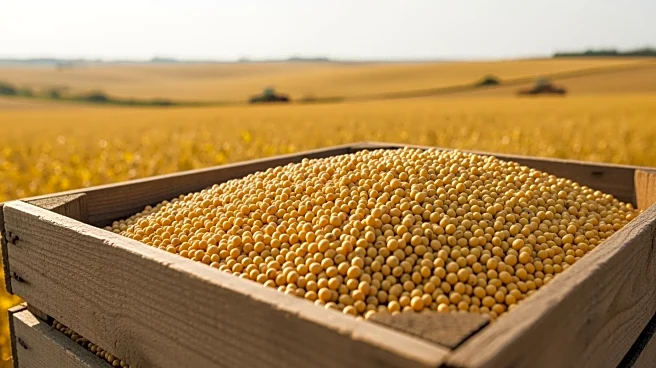What's Happening?
Soybean farmers in the United States are experiencing significant challenges due to the ongoing trade war between the U.S. and China. China, the world's largest soybean buyer, has historically purchased
a substantial portion of its soybeans from the U.S., accounting for over half of America's total exports of the crop. However, the Trump Administration's tariffs have altered this dynamic, leading China to reduce its commitments to U.S. soybean purchases and increase imports from South America, particularly Brazil. This shift has resulted in financial strain for American farmers, with increased production costs and decreased market opportunities. The American Soybean Association has highlighted the financial difficulties faced by farmers, with losses expected to reach $109 per acre for this year's crop.
Why It's Important?
The trade war's impact on soybean farmers underscores the broader economic consequences of international trade disputes. The reduction in U.S. soybean exports to China not only affects farmers' livelihoods but also has implications for the agricultural sector and rural economies. The financial strain on farmers could lead to long-term challenges in maintaining agricultural production and competitiveness. Additionally, the shift in China's purchasing habits may establish new trade routes that could permanently alter global soybean markets, potentially disadvantaging U.S. producers in the future.
What's Next?
President Trump has promised $12 billion in aid to support affected soybean farmers, but concerns remain about the adequacy of this assistance. The ongoing trade negotiations between the U.S. and China will be crucial in determining future market dynamics. If China continues to favor South American soybeans, U.S. farmers may face prolonged financial difficulties. The situation calls for strategic policy decisions to mitigate the impact on the agricultural sector and explore new market opportunities.
Beyond the Headlines
The trade war highlights the geopolitical complexities of agricultural trade and the strategic use of commodity purchases as leverage in international relations. The situation raises questions about the sustainability of current trade policies and the need for diversified export markets to reduce dependency on single buyers like China.








